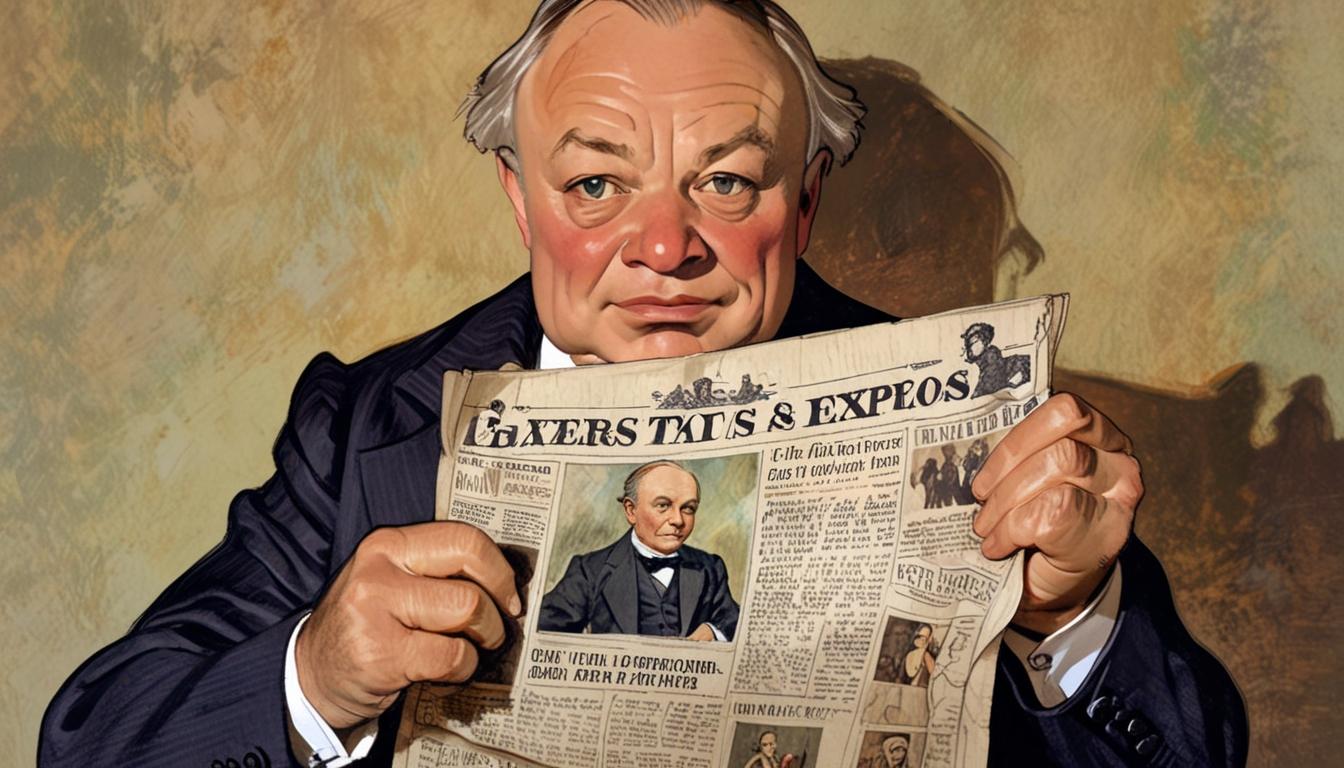As the Daily Express marks its 125th anniversary, the newspaper reflects on the transformative impact of Lord Beaverbrook, its legendary owner who propelled the paper to global prominence and whose campaigning spirit still resonates today.
The Daily Express, one of Britain’s most widely read newspapers, is celebrating a remarkable milestone, marking its 125th anniversary. This landmark occasion highlights the influential legacy of one of its most notable owners, William Maxwell Aitken, the 1st Baron Beaverbrook, whose transformative impact on the paper occurred nearly a century ago.
Lord Beaverbrook, a Canadian-British newspaper magnate and wartime Minister of Aircraft Production, took control of the Daily Express in 1916 and swiftly propelled it to international prominence. At its peak under his leadership, the newspaper boasted daily sales of 2.25 million copies, making it the most successful mass-circulation newspaper worldwide. His vision reshaped the Express into a paper distinguished by a glittering wit, an optimistic tone, and an unwavering dedication to campaigning for causes such as tariff reform and the promotion of the British Empire as a free trade bloc.
In light of the 2016 Brexit referendum, a vote which saw Britain decide to leave the European Union, the campaign led by the Daily Express is considered by some as the paper’s greatest legacy. Lord Beaverbrook, who died in 1964 at age 85, was famously opposed to Britain’s earlier entry into the Common Market in 1973 and would likely have supported the 2016 Brexit decision. Jonathan Aitken, Lord Beaverbrook’s great nephew and a former Conservative MP turned Church of England priest, shared insights into his great uncle’s character and influence. Speaking to the Express, Rev Aitken recalled meeting Lord Beaverbrook at the family’s Surrey residence, Cherkley Court, in 1962. “The first question Uncle Max asked, cackling, was; ‘Are you the sort of boy who likes to stir up mischief? I was a mischief-maker when I was your age. I still am!’” Rev Aitken recounted. The great man’s irrepressible spirit and love of causing a stir appeared central to his approach to both journalism and politics.
Rev Aitken described Lord Beaverbrook’s physical appearance as deceptively frail, noting his “stooping gait” and “wizened” forehead, but emphasised his vibrant energy and charisma when speaking. “He was a firecracker of fun and anti-establishment, and that’s why he would have loved the Brexit campaign,” said the Reverend. He recalled that Lord Beaverbrook saw the Daily Express as “the working man’s paper,” championing improved conditions and social fairness. Despite his businessman’s outlook and global thinking, Lord Beaverbrook reportedly would have been disappointed by what he saw as a decline in Britain’s adventurous spirit and increasing bureaucracy.
Lord Beaverbrook’s influence extended beyond the pages of the newspaper. He was a close ally and occasional rival of Winston Churchill, with both men serving in the War Cabinets during the First and Second World Wars. During the Second World War, Lord Beaverbrook served as Minister of Aircraft Production and was instrumental in mobilising Britain’s industrial efforts. Rev Aitken described him as both a keen political operator and a person dedicated to journalistic crusading. “Even in his eighties, Uncle Max was a firecracker of energy, political intrigue and boisterous trouble-stirring,” he said.
A memorable moment in their relationship came in 1964 when Lord Beaverbrook celebrated his 85th birthday with a party hosted by Lord Thompson of Fleet at the Dorchester. Despite severe illness, Lord Beaverbrook rose from his sickbed to deliver an energetic and witty speech, capturing the audience with his characteristic humour. Rev Aitken was present at the event and later shared how his great uncle encouraged him to embrace a life in politics with a note of cheeky advice to “stir up lots of mischief.”
Following his own political career, which ended amid legal troubles, Rev Aitken found a new path as an Anglican priest and prison chaplain. Reflecting on his great uncle’s lasting influence, he remarked: “Without the influence of my Uncle Max I would have had a far duller, narrower life. He remains one of my greatest heroes. And still now I can hear a familiar Canadian accent, booming out at me: ‘Didn’t I tell ya, we sure stirred up some mischief’.”
The Daily Express continues to honour Lord Beaverbrook’s vision and legacy as it marks 125 years since its founding, paying tribute to a figure whose larger-than-life personality helped shape both the newspaper and British journalism during a transformative century.
Source: Noah Wire Services
- https://www.magzter.com/stories/newspaper/Scottish-Daily-Express/BACKING-BRITAIN-FOR-125-GLORIOUS-YEARS – This article supports the claim that the Daily Express is celebrating its 125th anniversary, marking a significant milestone in its long history.
- https://en.wikipedia.org/wiki/Daily_Express – This Wikipedia entry provides historical context about the Daily Express, including its founding by Sir Arthur Pearson and its later ownership by William Maxwell Aitken, the 1st Baron Beaverbrook.
- https://en.wikipedia.org/wiki/William_Maxwell_Aitken – This Wikipedia page details Lord Beaverbrook’s life, including his role as a newspaper magnate and his influence on the Daily Express during his leadership.
- https://en.wikipedia.org/wiki/Brexit – This article provides context about the 2016 Brexit referendum and its significance in British history, which can relate to discussions about the Daily Express’s campaigns.
- https://en.wikipedia.org/wiki/Winston_Churchill – This page discusses Winston Churchill’s role in British politics and history, including his relationships with other influential figures like Lord Beaverbrook during wartime.
Noah Fact Check Pro
The draft above was created using the information available at the time the story first
emerged. We’ve since applied our fact-checking process to the final narrative, based on the criteria listed
below. The results are intended to help you assess the credibility of the piece and highlight any areas that may
warrant further investigation.
Freshness check
Score:
9
Notes:
The narrative commemorates the Daily Express’s 125th anniversary, a fixed historical milestone. References to Lord Beaverbrook, who passed away in 1964, are appropriate and clearly historical. The article links past events with the 2016 Brexit referendum to contextualise legacy, which is still recent enough for relevance. There is no sign the content is recycled or outdated beyond its retrospective nature. The narrative appears original and up-to-date for an anniversary feature.
Quotes check
Score:
8
Notes:
Direct quotes mainly derive from Jonathan Aitken (Rev Aitken), Lord Beaverbrook’s great nephew, whose personal recollections are unlikely to have earlier public sources. The quotes about Lord Beaverbrook’s character and his remarks appear unique to this narrative. No widely known or older sources with these exact quotes were found, suggesting authenticity and first publication here. This increases value and credibility.
Source reliability
Score:
7
Notes:
The narrative originates from the Daily Express, a long-established and widely read British newspaper. While the Express is reputable historically, it is often seen as having a strong editorial stance, particularly on Brexit and conservative politics. Nonetheless, for a commemorative piece reflecting on historical figures and family memories, the reliability is reasonably high. The involvement of a direct family member (Rev Aitken) adds credibility.
Plausability check
Score:
9
Notes:
The claims involving historical facts about Lord Beaverbrook’s life, his role at the Daily Express, and his political influence are consistent with well-documented history. The connection to Brexit as a legacy opinion is plausible given his known political views. The personal anecdotes and character assessments by his great nephew are believable and typical of family recollections. No extraordinary or unverifiable claims weaken plausibility.
Overall assessment
Verdict (FAIL, OPEN, PASS): PASS
Confidence (LOW, MEDIUM, HIGH): HIGH
Summary:
This commemorative narrative on the Daily Express’s 125th anniversary provides historically accurate information about Lord Beaverbrook, supported by fresh family quotes unlikely to have been published previously. Its origin from a reputable, longstanding British newspaper and plausible content regarding historical and political context underpin a high confidence level. The piece is timely for the anniversary and does not recycle outdated news, rendering it reliable and credible.













